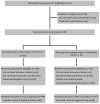Effects of facilitated family case conferencing for advanced dementia: A cluster randomised clinical trial
- PMID: 28786995
- PMCID: PMC5546584
- DOI: 10.1371/journal.pone.0181020
Effects of facilitated family case conferencing for advanced dementia: A cluster randomised clinical trial
Abstract
Background: Palliative care planning for nursing home residents with advanced dementia is often suboptimal. This study compared effects of facilitated case conferencing (FCC) with usual care (UC) on end-of-life care.
Methods: A two arm parallel cluster randomised controlled trial was conducted. The sample included people with advanced dementia from 20 Australian nursing homes and their families and professional caregivers. In each intervention nursing home (n = 10), Palliative Care Planning Coordinators (PCPCs) facilitated family case conferences and trained staff in person-centred palliative care for 16 hours per week over 18 months. The primary outcome was family-rated quality of end-of-life care (End-of-Life Dementia [EOLD] Scales). Secondary outcomes included nurse-rated EOLD scales, resident quality of life (Quality of Life in Late-stage Dementia [QUALID]) and quality of care over the last month of life (pharmacological/non-pharmacological palliative strategies, hospitalization or inappropriate interventions).
Results: Two-hundred-eighty-six people with advanced dementia took part but only 131 died (64 in UC and 67 in FCC which was fewer than anticipated), rendering the primary analysis under-powered with no group effect seen in EOLD scales. Significant differences in pharmacological (P < 0.01) and non-pharmacological (P < 0.05) palliative management in last month of life were seen. Intercurrent illness was associated with lower family-rated EOLD Satisfaction with Care (coefficient 2.97, P < 0.05) and lower staff-rated EOLD Comfort Assessment with Dying (coefficient 4.37, P < 0.01). Per protocol analyses showed positive relationships between EOLD and staff hours to bed ratios, proportion of residents with dementia and staff attitudes.
Conclusion: FCC facilitates a palliative approach to care. Future trials of case conferencing should consider outcomes and processes regarding decision making and planning for anticipated events and acute illness.
Trial registration: Australian New Zealand Clinical Trial Registry ACTRN12612001164886.
Conflict of interest statement
Figures
References
-
- van der Steen JT, Radbruch L, Hertogh CM, de Boer ME, Hughes JC, Larkin P, et al. White paper defining optimal palliative care in older people with dementia: a Delphi study and recommendations from the European Association for Palliative Care. Palliat Med. 2014;28(3):197–209. 10.1177/0269216313493685. . - DOI - PubMed
-
- Bosek MS, Lowry E, Lindeman DA, Burck JR, Gwyther LP. Promoting a good death for persons with dementia in nursing facilities: family caregivers' perspectives. JONA'S healthcare law, ethics and regulation. 2003;5 (2):34–41. . - PubMed
Publication types
MeSH terms
LinkOut - more resources
Full Text Sources
Other Literature Sources
Medical


